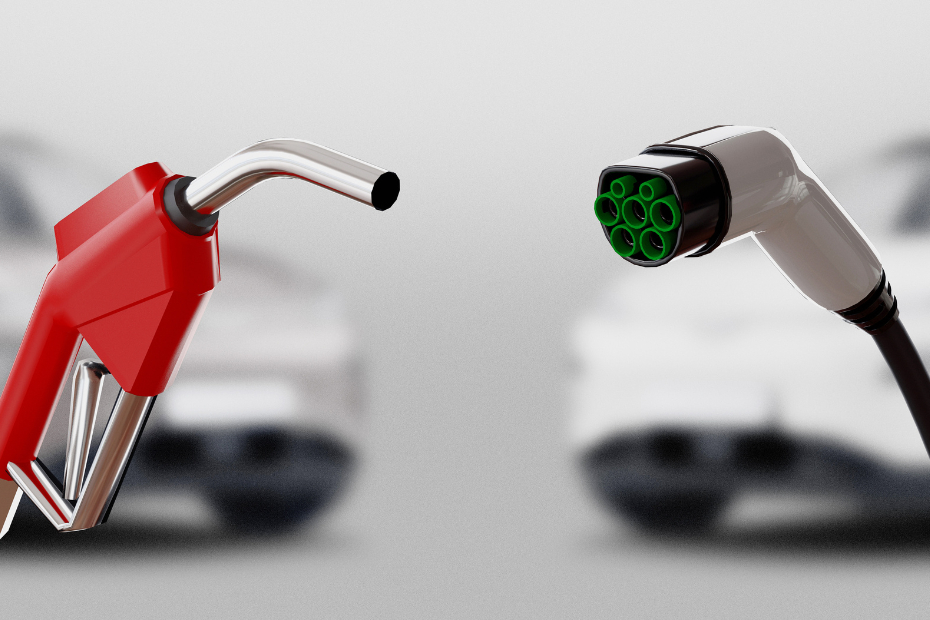Published July 21, 2023 • 5 Min Read
Looking for your next vehicle? The different fuels — gas, diesel and electric — have different characteristics, including ones that may affect your lifestyle and finances in the long run. Making the right call for you means analyzing the costs of each, the availability around you, and your personal needs or desires.
Knowing about different fuel types can help you narrow your auto choices. Here are some considerations for each fuel option:
Diesel
Diesel fuel is used in diesel engines, which use heated compressed air to ignite, rather than the more conventional gasoline spark ignition engines.
Good fuel efficiency
Diesel vehicles are often a highly fuel-efficient option. If you’re looking to take fewer trips to the pump, a diesel fuel reduces consumption by 15 to 30 per cent miles per km than a similar-sized vehicle that runs on gas, and their total range on a full tank can be double that of an electric car on a full charge.
High fuel expense
Diesel’s excellent fuel efficiency does come at a cost. Per CBC, diesel fuel costs you approximately 25% more than gas, but you may still save on fuel since you’re filling up less. Electric vehicle owners often have the option of free charging stations, so they can be even more appealing to those trying to save at the pump.
Maintenance — less frequent, more expensive
With fewer parts than a typical gas auto, a diesel vehicle will generally require less maintenance and last longer. There’s less need for ignition tune-ups since diesel vehicles run on compression ignition rather than spark plug technology. The resale value of diesel vehicles is usually higher than other options.
When repairs and maintenance are required, diesel owners should prepare to pay a bit more than gas or electric owners. For instance, oil changes may be up to three times more expensive on a diesel engine than a gas engine because they need specialized oil and burn oil faster.
Electric
Electric engines store electricity from the grid in a battery, which powers the motor.
Little to no fuel costs
One of the biggest draws to going electric is the money you can save on fuel. The average Canadian spends around $1,500 on gas annually, per the Manitoba Electric Vehicle Association. For electric vehicle owners, getting a full charge at most public charging stations is free. Even if you choose to charge at home, the average annual cost of electricity for a typical battery-electric vehicle is around $300.
“Range anxiety”
While the infrastructure is rapidly improving, there are still fewer public charging stations available than gas stations. Most electric vehicles have a range of 200-400 km on a full charge, while the average gas vehicle can reach around 475 km (and a diesel vehicle can double the range of an EV). Combining these two factors can lead to “range anxiety” in electric vehicle owners, a concern about the distance you can drive on a full battery.
EV charging stations are commonly found in large cities, but those living in more rural areas may not have enough charging stations to feel comfortable. The good news is that Canada has approved funding for 50,000 new charging stations in parking lots, condos, malls and even grocery stores nationwide by 2030.
Government rebates
To incentivize Canadians to reduce emissions by going electric, Canada announced they will offer cash rebates ranging from $2,500 to $5,000 on all eligible zero-emission vehicles. This is intended to help ease the weight of the upfront costs to make the purchase at the dealership less expensive. Here’s a list of the EVs eligible for point-of-sale incentives — you can use the search function to see if your desired model applies.
Higher upfront costs
While government rebates are available, the purchase price of electric vehicles is typically more than gas or diesel. It’s possible to make that money back over time with low operating costs and less maintenance, but high upfront costs can still be hard for some customers to stomach.
Zero emissions
Electric vehicles are the most environmentally-friendly option for drivers looking to reduce their carbon footprint. EVs have no tailpipe and don’t require any oil, which is non-biodegradable and can damage an environment if improperly disposed of.
Hybrid vehicles
Hybrid electric vehicles (HEVs) are also an option to consider on the market. At higher speeds, an HEV’s main power source is a fuel combustion engine powered by gas, but they store electric power from a battery to use at lower speeds. HEVs have more range and fuel efficiency than fully electric vehicles while quieter and more environmentally friendly than gas vehicles. However, maintenance and upfront costs may be expensive.
Gas
Gas engines run on spark ignition systems, where the gasoline is ignited by a spark from a spark plug to propel the vehicle forward.
Great infrastructure
Most of Canada’s roads and cities are built around gas cars — even the most remote areas of the country typically have a gas station somewhere within range. Electric owners and diesel owners, to a lesser extent, won’t have as much peace of mind that gas vehicle owners have.
Maintenance
Out of these three options, gas cars have the most parts and will require more frequent maintenance. Oil changes, ignition check-ups, and coolant/transmission flushes are all common services for a gas vehicle.
Lower upfront costs
Gas vehicles are generally cheaper to drive off the lot than diesel or electric vehicles. As the more conventional option, you will also get more variety of vehicles to choose from at a dealership as well as a familiar driving experience.
Higher carbon emissions
Electric vehicles, and to a lesser extent diesel vehicles, are generally much cleaner than gas. That’s because the more fuel your vehicle burns, the more greenhouse gases it produces. Gas cars emit pollutants such as nitrogen oxide, carbon monoxide, particulate matter, and formaldehyde.
This article is intended as general information only and is not to be relied upon as constituting legal, financial or other professional advice. A professional advisor should be consulted regarding your specific situation. Information presented is believed to be factual and up-to-date but we do not guarantee its accuracy and it should not be regarded as a complete analysis of the subjects discussed. All expressions of opinion reflect the judgment of the authors as of the date of publication and are subject to change. No endorsement of any third parties or their advice, opinions, information, products or services is expressly given or implied by Royal Bank of Canada or any of its affiliates.
Share This Article






